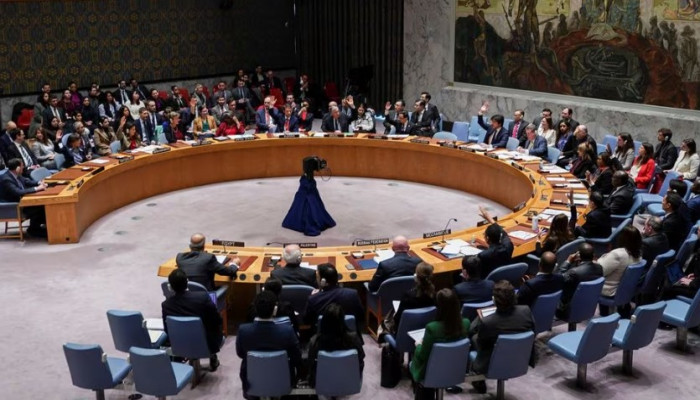UNSC passes Gaza aid resolution with U.S. abstention
- In Reports
- 01:34 PM, Dec 23, 2023
- Myind Staff
After days of intensive negotiations regarding a humanitarian pause and aid delivery to the war-torn Gaza Strip, the United States chose to abstain on a United Nations Security Council resolution, thereby enabling its adoption by the 15-member body. The resolution, which fell short of a direct call for a ceasefire, was eventually adopted after a week of vote delays and intense negotiations aimed at avoiding a potential United States veto.
The adopted resolution "calls for urgent steps to immediately allow safe, unhindered, and expanded humanitarian access and to create the conditions for a sustainable cessation of hostilities."
Amidst global condemnation over the escalating death toll in Gaza during the 11-week conflict between Israel and Hamas, coupled with a deepening humanitarian crisis in the Palestinian enclave, the United States abstained from voting. This decision allowed the 15-member council to adopt a resolution put forth by the United Arab Emirates.
While the majority of council members voted in favor of the resolution, Russia also abstained. Notably, Russia had initially favoured a draft that explicitly called for "an urgent and sustainable cessation of hostilities" to facilitate humanitarian aid access.
The United States and Israel are against a ceasefire, as they believe it would primarily benefit Hamas. Instead, Washington supports temporary halts in fighting to safeguard civilians and facilitate the release of hostages taken by Hamas.
UAE U.N. Ambassador Lana Nusseibeh, addressing the council after the vote, stated, "We believe that the resolution begins to unblock life-saving aid, whose denial has condemned more than half a million people in Gaza to famine."
Following extensive negotiations to secure U.S. support, the resolution no longer diminishes Israel's control over all aid deliveries to the 2.3 million people in Gaza. Israel currently oversees the limited aid deliveries through the Rafah crossing from Egypt and the Israeli-controlled Kerem Shalom crossing.
However, several council members, including Russia, expressed frustration over the weakening of language related to a cessation of hostilities. This sentiment was shared by Arab and Organisation of Islamic Cooperation states. Some diplomats suggested that these changes could be interpreted as tacit approval for Israel to take further action against Hamas, particularly in response to a deadly attack on October 7th.
U.N. Secretary-General Antonio Guterres will appoint a senior coordinator for humanitarian relief truck inspections, altering the original draft. The U.N. General Assembly called for a humanitarian ceasefire, supported by 153 states after a prior U.S. veto.
Palestinian envoy Riyad Mansour urged implementation with pressure for an immediate ceasefire. Israel's Deputy Ambassador Jonathan Miller emphasized aid monitoring enhancements shouldn't compromise security inspections. U.N. Secretary-General Antonio Guterres noted Israel's military operation hampers humanitarian aid distribution in Gaza.
Image source: Reuters







Comments